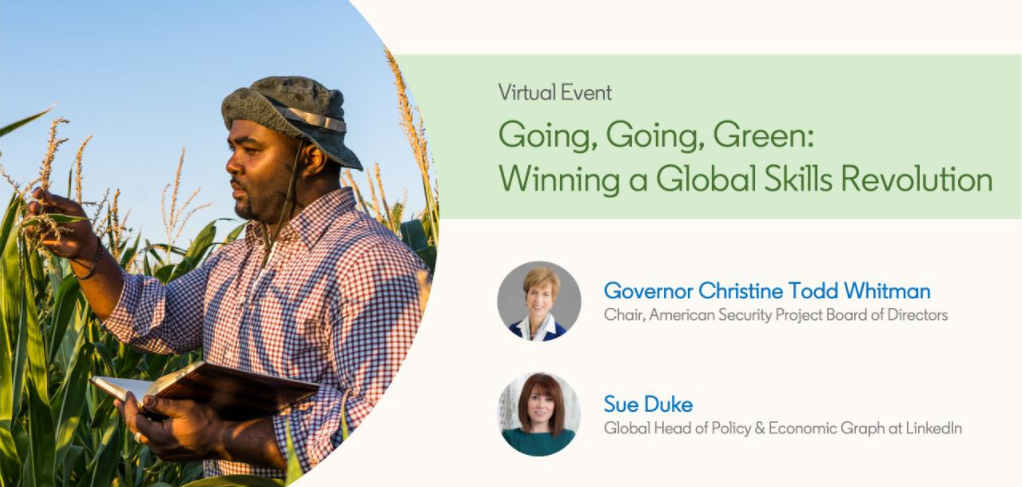
Event Recap: Going, Going, Green: Winning a Global Skills Revolution
On Wednesday, March 30, the American Security Project hosted an event with its chairperson, Governor Christine Todd Whitman, and Sue Duke, the Global Head of Public Policy and Economic Graph at LinkedIn. Bryan Walsh, the editor of Future Perfect at Vox moderated the conversation. The panelists discussed LinkedIn’s Global Green Skills Report 2022, which provides new data on green skills and jobs from across the world to empower policymakers, governments and business leaders with actionable insights to help them transition the global workforce to a green economy future. Ultimately, green skills can, will, and must drive the future global economy, and meeting this environmental challenge will also become a boon to the economy if the global green skills gap can be closed.
The conversation opened with Bryan Walsh reflecting on the risks of continued fossil fuel dependence which gives malevolent actors such as Russia the potential to destabilize energy markets for geopolitical gains. Sue Duke echoed this concern but added that moments of crisis also present opportunities. Particularly, the Russian-Ukraine war is accelerating the West’s pivot away from Russian oil and gas. However, the window for meaningful action against climate change is closing and the scale of energy transition away from hydrocarbons entirely remains daunting. Accordingly, the transition to renewable energy is a human capital challenge as well as an environmental imperative.
As the demand for green skills rises, it will become vital for policymakers, educators, and employers to facilitate parallel growth in the supply of talent. Governor Whitman posited that in order to fill this emerging gap there must be an emphasis on universal and accessible green skills education. Technical schools and community college classes would be particularly important in offering this education and training. Duke highlighted how targeted and dynamic skills programs outside of formal academia should be a priority. Sue Duke also contended that creatively applying green skills in unexpected roles will be crucial to meeting carbon reduction goals. It’s not just solar panel installers and wind turbine technicians but also facilities and compliance managers, financial analysts, and land acquisition managers that will make a difference. Whitman identified these laborers, along with city planners and supervisors for retrofitting older facilities, as those working on the ground directly on electricity and water to implement green technologies, underscoring why their education is paramount.
With any economic transition, however, there are “pain points,” according to Bryan Walsh. On this topic, Sue Duke asserted the risks of failing to make green skills education available quickly and equitably. There is a danger of not moving fast enough to expand green skills in the labor force, and by 2025 demand will outpace the supply of green skilled labor. There are also demographic, educational, and gender disparities among current green skilled workers favoring younger college-educated males. These disparities must be overcome to ensure suitable dissemination of green skills at all levels and sectors of the labor force.
Similarly, Whitman drew attention to those workers in industries such as coal that deserve to be provided with the skills to find employment as their industries disappear. She added that the politicization of federal action means that we should instead rely on governors and mayors to deliver progress, especially given their more direct accountability to constituents.
To conclude, Governor Whitman emphasized the need for governments to work with the private sector and Sue Duke reiterated the need for green skills across the sectors and education spectrums of the labor force.
Video of this event is available on LinkedIn.





